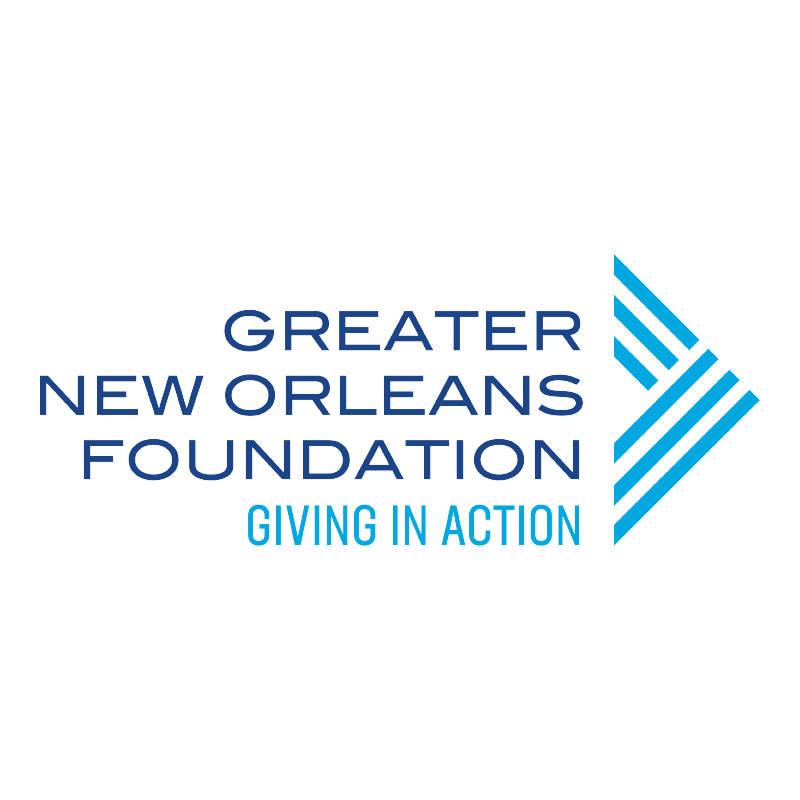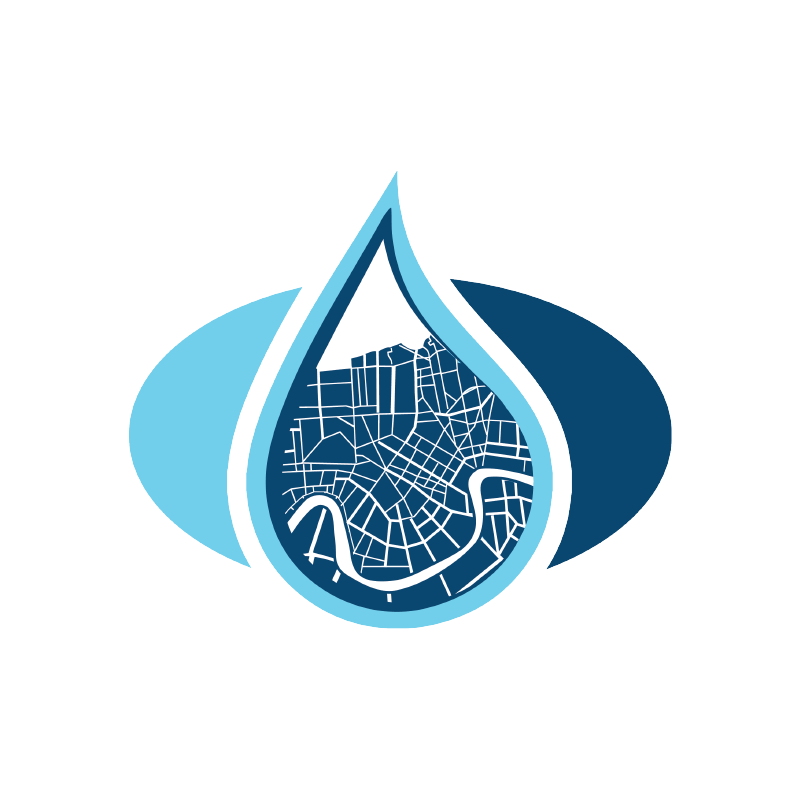This category measures how well our community supports stormwater detention and retention efforts in New Orleans. Doing so reduces flooding, improves water quality (reduces pollution), and reduces infrastructure costs. Because our city's pumping system is limited and can only pump so much water out at a time, green infrastructure and other strategies to reduce stormwater runoff are extremely important.
What is your impact in this category? Take the Love Your City Assessment and learn how you can maximize your organization’s impact!
DID YOU KNOW?
New Orleans is the 3rd rainiest city in the country, with an average of 62 inches of rain each year.
We are the only city in the United States that relies solely on pumping stations for drainage because 95% of Orleans Parish is at or below sea level. In fact, All of New Orleans is as high as Cafe Du Monde on Decatur Street from the street to the top of the awning. Because we are surrounded by waterways, we have a lack of land mass, and that the city is as high as about 8-9 feet, we are flood prone.
Our drainage system can only handle t and only a half inch of rain in every hour after that. On August 5th, 2017 the city of New Orleans experienced 8-10 inches inches in total causing massive flooding in most parts of the city. Downtown New Orleans and Algiers experienced up to 5 inches of rain in less than 3 hours which is unprecedented.
Across the United States Water Infrastructure is aging with most historical cities taking the brunt in this area. Most water mains and pipes in New Orleans are over 115 years old and were built in the first wave of development in the 1930s.
Due to climate change, rain-bursts such as what has happened on August 5th and as recently as June 10th, 2020, New Orleans will experience more flooding events. This is caused by rising global emissions which causes the earth to heat at record temperatures. In the humid, subtropical climate, more water is trapped in the atmosphere and released at a higher rate and pace than what is normal.
To make matters worse, due to our consistent pumping and reliance on it (24/7 to be exact) it increases our subsidence. New Orleans is a delta, aka a big wet sponge. When we pull water and nutrients from the ground using the pumping system, we dry out our sponge city, forcing us to sink and degrade our ecosystem. This in turn increases pot holes, degrades properties from ruining foundations, and increases flooding due to water run-off falling into sinking streets and neighborhoods. In fact, New Orleans is one of the fastest sinking cities on Earth, with an average rate of 2 inches per year.
In order to prevent flooding due to aging infrastructure and rain events caused by climate change, everyone in New Orleans should help do their part to prevent flooding. To do this, we recommend green infrastructure which allows us to hold, store, slow, and sink water.
Green Infrastructure is a scientifically proven solution that helps reduce flooding, especially in low-lying communities that are susceptible to flood events. It also has a multitude of other benefits including:
Sanitizing and reducing waste in our water systems
Reduces heat in neighborhoods that are experiencing heat island effects
Reducing subsidence and the need to pump consistently
Reduces global emissions and greenhouse gases
Reduces public health concerns related to heat and lack of public parks, especially in low income, at-risk communities
Increases property values and community pride
Great vehicles for environmental stewardship, as it supports native plants and local ecosystems.
OUR CHALLENGE
Reduce the amount of rain that enters our storm drain system, by capturing it where it falls and helping it enter the soil.
Reduce subsidence and the amount we pump to prevent long term negative impacts on our streets, homes, and ecosystem
Reduce our local greenhouse and emission output to reduce heat in the area, which in turns reduces rain burst and other flooding events brought on by natural and man-made disasters.
WHAT YOU CAN DO / WHO CAN HELP
Remove paving in your yard or participate in the Healthy Block program / Urban Conservancy’s Front-Yard Initiative / 504-717-6187
Plant Trees in your neighborhood / SOUL NOLA / 504-535-5116 / NOLA Tree Project / 504-415-8434
Install a Rain Barrel / Greenlight New Orleans / 504-324-2429 / United Way / (504) 897-6277 / Recharge NOLA
Learn how to install green infrastructure in your neighborhood / Water Wise / Recharge NOLA / Global Green
Plant sales and garden trainings / Parkway Partners / 504-620-2224 / New Orleans City Park / 504-482-4888
Educational Resources to help you in rain events / City’s Ready for Rain Program
Get help understanding & measuring water quality / Lake Pontchartrain Basin Foundation / 504-836-2215
Adopt a catch basin on your street to reduce flooding and pollution in your neighborhood / City’s Adopt a Catch Basin Program
Post a picture of flooding and help us track climate change / ISeeChange
Get help working with developers to get better stormwater controls under construction / Gulf Restoration Network’s Flood Less Campaign
Install a rain garden on your lawn / Green Man Dan / 504-123-4567 / Batture, LLC / 504-533-8644 / Mastodonte / 504-264-1352
Install pervious cement on your property / Quality Site-work Materials / 855-469-2015
Join the Green Infrastructure workforce, Launch NOLA, Groundworks NOLA, Limitless Vistas
WHAT DO POLITICAL LEADERS NEED TO KNOW ABOUT YOUR SECTOR?
Storm-water Management and Green Infrastructure is part of the fastest growing industry in the world and expected to grow to $7.9 billion by 2023. Green Infrastructure has a higher median annual wage than most jobs in Louisiana while also being one of the most diverse in terms of education and experience requirements. Storm-water management jobs diversify our economy and increase socioeconomic statuses for low-wage workers often relegated to service and hospitality jobs. By just taking a small percentage of tax dollars often invested in tourism, and reinvesting them into water management education, workforce development, and contracts we could double the areas economic growth while also protecting land and reducing flooding.
Green Infrastructure and water management have a multisite of benefits that would greatly benefit the New Orleans metro area including reducing water run-off into the area's fragile drainage system leading to a reduction in urban, suburban, and river flooding. Because New Orleans uses surface water for its drinking water, it improves water quality because water management systems filter pollutants and trash that often end up on our drinking water. Reduction in Sewage loads and pressure on the overall water system. Reduction of CO2s and all air pollutants and noise pollution from industry. It also increases recreation and availability of public spaces which also can reduce depression, stress, and anxiety, especially among vulnerable populations. Lastly, it creates new habitats for urban wildlife to thrive which can increase the urban center's overall environmental health & resiliency.
Water management does not live in a vacuum and is a multi-disciplinary area that impacts all aspects of our lives. Water management is more than the collection of water for the reduction of flooding, it is also about water quality, affordability, accessibility, and its use for public good. Political leaders statewide should understand that all mass industries contribute to sea-level rise, including our states most profitable sectors such as oil & gas, import & exports, and tourism. Water management is an arm of environmental stewardship and is a multifaceted action that benefits everyone and every industry. When looking at sea-level rise and rain burst that negatively impact our state, we must not overlook our carbon footprint which makes it harder for cities and communities to be resilient. State and city leaders must recognize our carbon footprint negatively impacts our long-term efforts in this industry, even with its own growth. Without proactive leadership in these sectors, water management will appear to not work because we're countering this work with regressive policy. Resiliency is more than an attitude it is a prescribed amount of tools. It requires resources and their equitable access, redundancy in steps so these efforts that can be easily practiced and duplicated, and rapidity of these actions to meet urgent and emergency needs. Water should be approached with the 3Rs and met with progressive, proactive, long-term policies that improve our strongest industries and not leave them antiquated and damaging to our state.
WHAT ARE YOUR LOCAL POLICY RECOMMENDATIONS?
Update Urban Water Plan to connect the entire greater New Orleans Area. This plan unlike the first must include policies that encourage and simplify progressive actions towards all climate mitigation and resiliency strategies.
Re-organize Sewerage & Water Board and the Department of Public Works in ways that reflect cohesion and prevent wasteful spending. Before increasing rates or putting a storm-water fee in place, residents must feel that the systems can be trusted to execute strategic plans diligently and transparently.
Divert a percentage of tourism dollars to water and climate education, workforce development, and grants to nonprofits uplifting this work daily. Reuse of blighted property and unused city property into rain gardens (aka NORA lots) and community gardens in all parts of New Orleans to increase access to physical and mental wellness
WHAT ARE YOUR STATE POLICY RECOMMENDATIONS?
Updated Urban Water Plan that connects the entire greater New Orleans Area. This plan unlike the first must include policies that encourage and simplify progressive actions towards all climate mitigation and resiliency strategies.
Re-organized Sewerage & Water Board and the Department of Public Works in ways that reflect cohesion and prevent wasteful spending. Before increasing rates or putting a storm-water fee in place, residents must feel that the systems can be trusted to execute strategic plans diligently and transparently.
Divert a percentage of tourism dollars to water and climate education, workforce development, and grants to nonprofits uplifting this work daily.
Reuse of blighted property and unused city property into rain gardens (aka NORA lots) and community gardens in all parts of New Orleans to increase access to physical and mental wellness
WHAT ARE YOUR FEDERAL POLICY RECOMMENDATIONS?
Pass all parts of the Green New Deal and restore and strengthen the Clean Water Act.
POWERED BY
Category Leader
Jessica A. Dandridge M.A
Executive Director
The Water Collaborative of Greater New Orleans
www.nolawater.org
jessica@nolawater.org






